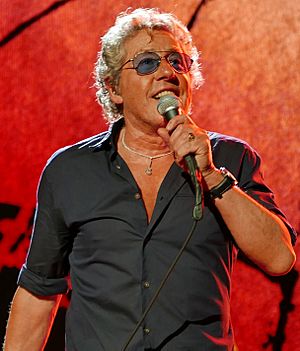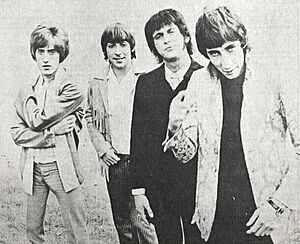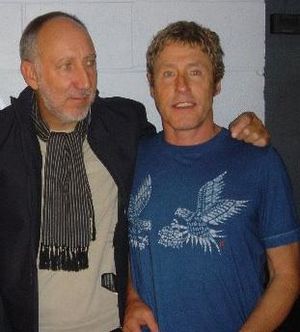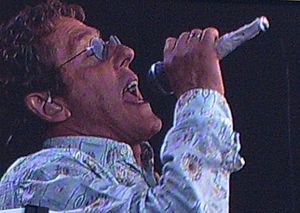Roger Daltrey facts for kids
Sir Roger Harry Daltrey (born 1 March 1944) is an English singer, musician, and actor. He is a founder and the lead singer of the rock band The Who. Daltrey is famous for his powerful voice and for being exciting to watch on stage. His stage style made people call him one of the "gods of rock and roll."
Some of Daltrey's hit songs with The Who include "My Generation", "Pinball Wizard", and "Won't Get Fooled Again". In 1973, he started a solo career while still in The Who. He has released ten solo albums. His solo hits include "Giving It All Away" and "Without Your Love".
The Who is one of the most important rock bands of the 20th century. They have sold over 100 million records worldwide. As a member of the band, Daltrey has received many awards. He was added to the Rock and Roll Hall of Fame in 1990. He and bandmate Pete Townshend also received Kennedy Center Honors in 2008.
Daltrey has also been an actor and film producer. He has had roles in movies, theater, and television. In June 2025, Daltrey was made a Knight Bachelor for his work in music and charity.
Contents
Early Life and School
Roger Daltrey was born on March 1, 1944, in London, England. This was during a World War II bombing raid. He was the oldest of three children. His father was a soldier in the war. Because of the danger, three-month-old Roger and his mother moved to a farm in Scotland for safety.
Daltrey went to the same school as his future bandmates, Pete Townshend and John Entwistle. He did well in school and passed an important exam called the eleven-plus. This allowed him to go to a special high school called a Grammar School.
In 1957, Daltrey made his first guitar himself. He joined a band called the Detours as the lead singer. In 1959, his father bought him an Epiphone guitar, and he became the band's lead guitarist. He was also the leader of the band. He grew up in a tough neighborhood where people often settled arguments by fighting.
Daltrey was later expelled from school. Townshend wrote in his book that Daltrey had been a good student until then.
The Who
How The Who Began
In 1964, the band learned another group was called the Detours. They needed a new name. Pete Townshend's roommate suggested "The Who." The next morning, Daltrey made the final decision, saying, "It's the Who, innit?"
After their first hit single, "I Can't Explain", in 1965, Townshend began writing more of the band's songs. This meant Daltrey had less control over the band. Late in 1965, the other members fired him after he got into a fight with their drummer, Keith Moon. A week later, they let him back in after he promised not to cause more trouble.
The band's second single, "Anyway, Anyhow, Anywhere", was written by both Daltrey and Townshend. Daltrey became known for his amazing singing and stage presence. He had a signature move where he would swing his microphone around by its cord. His powerful scream at the end of "Won't Get Fooled Again" became one of the most famous moments in rock music.
Major Success and Acting
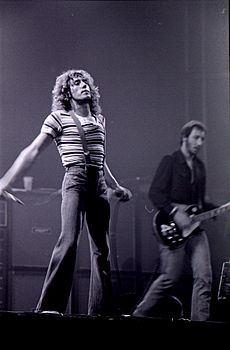
By 1973, Daltrey was also having success with his solo music and acting. He looked at the band's finances and found they were a mess. This caused tension in the band. During one argument, Townshend hit Daltrey with his guitar. Daltrey responded by knocking Townshend unconscious with one punch.
Daltrey became the face and voice of the band during their most successful albums. These included Tommy (1969), Who's Next (1971), and Quadrophenia (1973). In 1975, he starred in the movie version of Tommy. He was nominated for a Golden Globe Award for his acting.
Changes in the Band
The Who's drummer, Keith Moon, died in 1978. The band continued with a new drummer, Kenney Jones, but Daltrey felt he wasn't the right fit. The Who broke up in 1983 because Townshend felt he couldn't write for them anymore.
The band got back together in 1989 for a 25th Anniversary Tour. They have toured many times since then. In 1996, Daltrey was accidentally hit in the face with a microphone stand before a show. It fractured his eye socket, but he wore an eye patch and performed as planned.
After bassist John Entwistle died in 2002, Daltrey and Townshend decided to continue their tour. They released a new album, Endless Wire, in 2006. In 2010, The Who performed at the Super Bowl XLIV halftime show. Over 105 million people watched them worldwide.
Daltrey's Songwriting for The Who
Daltrey wrote a few songs for The Who in their early years.
- "Anyway, Anyhow, Anywhere" (1965) – He wrote this with Townshend.
- "See My Way" (1966) – His song on the album A Quick One.
- "Here for More" (1970) – The B-side for the single "The Seeker".
He also wrote a song called "Certified Rose," which was released on his 2018 solo album.
Solo Music Career
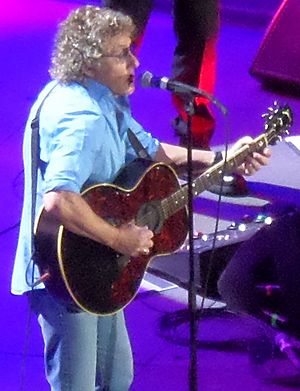
Daltrey has released ten solo albums. His first album, Daltrey (1973), came out while The Who was on a break. The single "Giving It All Away" was a top 5 hit in the UK. His second album, Ride a Rock Horse (1975), was also very successful.
Many famous musicians helped with his solo albums. Paul McCartney wrote the song "Giddy" for his 1977 album One of the Boys. That album also featured Eric Clapton and his bandmate John Entwistle.
His 1980 album, McVicar, was the soundtrack for a movie he starred in. It had two hit singles, "Free Me" and "Without Your Love". "Without Your Love" was his best-selling solo song.
In 1992, Daltrey performed at the Freddie Mercury Tribute Concert. He sang the Queen song "I Want It All" to honor his friend Freddie Mercury.
To celebrate his 50th birthday in 1994, Daltrey performed two shows at Carnegie Hall in New York City. This led to a successful tour called Daltrey Sings Townshend.
In 2009, he started a solo tour with a new band called "No Plan B." In 2018, he released a new solo album, As Long as I Have You.
Legacy and Influence
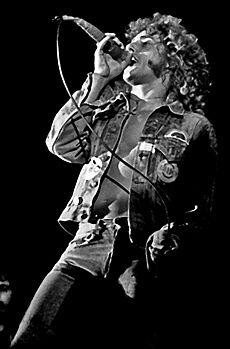
Pete Townshend said Daltrey "almost invented the pseudo-messianic role" on stage. This means he acted like a powerful leader, a style later copied by singers like Jim Morrison and Robert Plant. His stage persona made him known as one of the "gods of rock and roll."
His famous move was swinging his microphone around. He matched the microphone's movements to the beat of the music. A review of a 2007 concert said, "Live rock doesn't get any better."
Personal Life
Daltrey has been married twice. He has a son, Simon, from his first marriage. He also has a son, Mathias, from a relationship in 1967. In 1971, he married model Heather Taylor. They have three children: Rosie Lea, Willow Amber, and Jamie.
On his 50th birthday, Daltrey learned he had other children from relationships in the late 1960s. He welcomed his three daughters into his family. In total, Daltrey has eight children and fifteen grandchildren.
In 1971, Daltrey bought a farm in East Sussex, England. He is a supporter of the Arsenal F.C. football club. In 2018, he said that performing loud music for many years has damaged his hearing and that he is now "very, very deaf."
Charity Work
Daltrey does a lot of work for charity. In 2000, he helped start the Teenage Cancer Trust concerts. These annual shows have raised over £20 million for young people with cancer. The Who has performed many times, and Daltrey has also performed solo.
In 2011, Daltrey and Pete Townshend launched the Daltrey/Townshend Teen and Young Adult Cancer Program at a hospital in Los Angeles. This program is funded by the Who's charity, Teen Cancer America. Daltrey donates a part of the ticket sales from his solo tours to help fund these cancer centers.
Awards and Achievements
- 1976: Nominated for a Golden Globe Award for his role in the movie Tommy.
- 1990: Inducted into the Rock and Roll Hall of Fame as a member of The Who.
- 2001: Received a Grammy Lifetime Achievement Award with The Who.
- 2005: Inducted into the UK Music Hall of Fame as a member of The Who.
- 2008: He and Pete Townshend received the Kennedy Center Honors, one of America's highest awards for artists.
- 2012: Received an honorary degree from Middlesex University for his contributions to music.
- 2025: Appointed a Knight Bachelor for his services to music and charity.
Images for kids
-
Daltrey performing onstage at Maple Leaf Gardens in Toronto, Ontario, Canada, 1976
-
Daltrey in Sherman Oaks, Los Angeles, 2008
See also
 In Spanish: Roger Daltrey para niños
In Spanish: Roger Daltrey para niños
 | George Robert Carruthers |
 | Patricia Bath |
 | Jan Ernst Matzeliger |
 | Alexander Miles |


